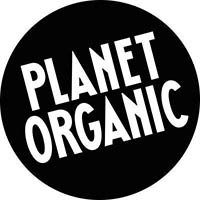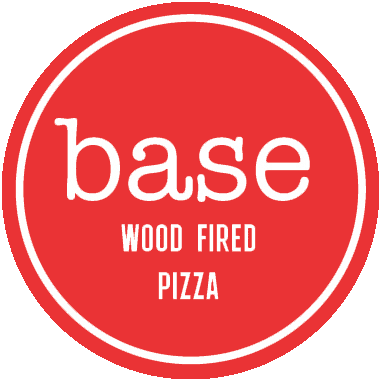“I think for me now, it is very much about being honest and being transparent and being open about what we do, and how we do it. And also that we’re not there yet. And I think that is the, you know, we’re not this ‘Look at us. Look at us, we’re amazing!” It’s very much about. ‘Okay, we still have these challenges. How can we find it… How can we work hard to find the best way of doing things so that it makes it easier for others?’ That’s probably my ultimate game.”
Chantelle Nicholson
We are back with our BlogCast, a Bizimply blog series!
🎧 Every month we will be revisiting Bizimply’s team favourite episodes from The Hospitality Mavericks Podcast.
Hosted by Michael Tingsager, the podcast brings together the world’s Mavericks who think differently from the norm — don’t forget to check out the latest BlogCasts.
Meet Chantelle Nicholson: A multi-award-winning chef and owner of Apricity, a Michelin Green Star restaurant. One of the leading female voices in UK hospitality and one of the top 100 influential women in hospitality, Nicholson advocates for seasonality and sustainability.
She is the author of “Planted”, a must-read book for those who love to cook and especially love plant-based.
Keep reading to find out more about how her passion for cooking, sustainability and circular economy and great team culture helped her navigate the current challenges of the industry.
Main Highlights:
- How building a great team culture helped Apricity’s success story.
- Tips to navigate the current challenges of the industry.
- Chantelle’s intrapreneurial journey and how she managed the ups and downs as the founder.
Journey into Hospitality: From growing up surrounded by nature to running a Restaurant
Growing up in New Zealand, Nicholson loved cooking from a very young age.
“Gosh, how long have you got? No. So I think let’s start at the beginning. So as you can probably hear, I did not grow up here. I grew up in New Zealand surrounded by beautiful produce, beautiful scenery and also being a very small isolated country, eating a lot of seasonal food. And I think that’s where my love for produce my love for, plants, probably, probably started from. So I always loved food. Loved eating it. I have loved cooking it from a very, very young age. But didn’t even consider it a career path. Finished high school and decided that I didn’t really know what I wanted to do. So, I thought I’d do something that was kind of quite broad. We went to universities to do Law and [… ] that was where I started, I guess.”
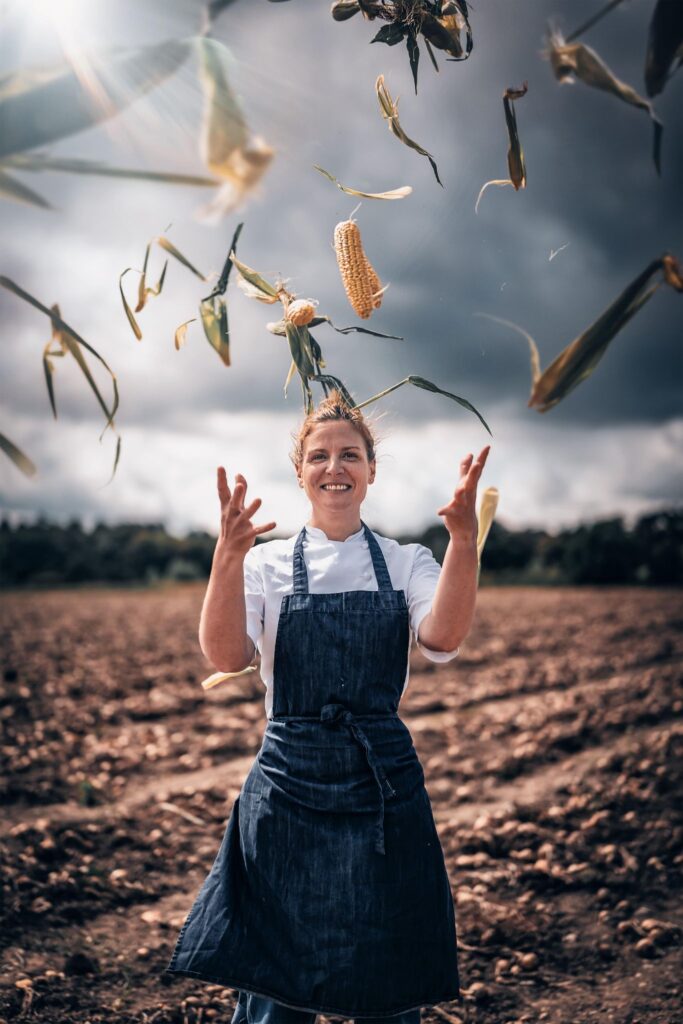
“After High School, partway through that, I needed a job to be able to fund my studies, and I wanted to do something that was different to what I was studying. I wasn’t particularly enamoured with what I was studying. To be honest. So, I thought, if I go and do something that I do enjoy, then, hopefully, that’s also, kind of a killing two birds with one stone to get an income. And do something. Learn something new. So went into a local Cafe in the city that I was studying in and just said to them ‘Look I have no experience but I really love to cook. I’d really like a job. And here’s my CV. I’m just going to leave this with you.’ to which they replied that they were about to put out an ad for a weekend cook, so they were happy to give me a go.”
“So I always loved food. Loved eating it. I have loved cooking it from a very, very young age. But didn’t even consider it a career path. Finished high school and decided that I didn’t really know what I wanted to do”
“So I guess that’s where the cooking, professional cooking began many, many years ago. I ended up cooking pretty much full-time whilst I was studying. I then went on to work in a small restaurant and finished my studies and just kept cooking because I just loved the energy of the kitchen and just being part of something. And then my mother said to me, well, you’ve kind of spent quite a long time and quite a lot of money in these degrees that you’ve now got. Just go and give them a go. Like, if it’s not for you, it’s not for you, but you won’t know unless you try. To which I responded as the dutiful daughter and did just that. So, I went and started working in the law field, the law and banking really, for about a year and a half.”
“But throughout that time, still deviled a little bit and the cooking. And actually entered a competition, which was ironically, run by Gordon Ramsay and actually managed to get to the final of that competition. […] I was then offered a job at the Savoy Grill by Josh Emmitt. Who was the head chef of the Savoy Grill at that time. Also, I fellow Kiwi, and basically said to me ‘Well, whenever you come to London, there’s a job for you’. So I thought that was far too good an opportunity to turn down. So 18 and a half years ago, […] that was when I moved to London.”
“So I actually then came out of the kitchen and opened what was known as the Gilbert Scott restaurant in St Pancras, as general manager. Open that in 2011, then stuck with doing a little bit of kitchen work, but mainly kind of hops in running the restaurants to the open Treadwell’s in 2014 in an operational role.”
“But then six months after opening, went back into the kitchen as an interim measure, but then never came back out. And then obviously lots of things happened with COVID and everything. And I decided that I really wanted to open somewhere that was small and was a bit more purpose-led in terms of my ethos and my thoughts about food. So opened Apricity just over a year ago, in April 2023. And here we are today.”
The meaning behind Apricity’s name…
“So I wanted a name that symbolized regeneration. But regenerations is quite a clunky word and I looked it up and different languages and just couldn’t really find something that kind of suited. Then I happened to stumble across Apricity, which actually means the warmth of the winter sun. So for me, that symbolizes regeneration, rejuvenation and joy. Which is what I wanted the restaurant to be.”
“Then I happened to stumble across Apricity, which actually means the warmth of the winter sun. So for me, that symbolizes regeneration, rejuvenation and joy. Which is what I wanted the restaurant to be.”
Food is Joy, Food is Memory, Food is Cohesive, and Food is Life.
How did the idea of the restaurant come together?
“I think part of it is full circle from growing up, as I mentioned before, and just being surrounded by amazing food. Being also surrounded (by) my aunt and uncle had a stone fruit Orchard. So it was really I was kind of exposed at a very young age to how food is grown, produced and the challenges that come with it. And the hard work that goes into it. But then also the amazing taste of new freshly picked sun-ripened peaches, nectarines, and apricots. It’s just – You just can’t beat it. So I think for me it’s very much been a Common Thread running through that.”
“At a base level, yes, we need food to survive, right? But then moving on from that, it’s very much something that we enjoy. It’s very much something that connects all of us. And it’s very much something that can just evoke a lot of memories, can evoke a lot of joy, and can also, bring people together in a way that nothing else really can.”
“[Meals are] a bit of a mediator noise and I guess, yeah, it kind of is that that sense of bringing people to a common ground”
Author’s note: Nicholson’s reflections here make me think of a statement made to me by one of my university professors that has resonated with me: “Diplomacy is what we do during coffee breaks.” Dining out can be similar to that. Having a conversation about something else and getting to know someone better through what they think about their food or the emotions it makes them experience.
How is the vision turning into practice?
“Yeah that’s very much it in practice versus being a philosophy, it’s actually in practice now. And I think it’s very much looking at the 360 approaches to food and to restauranting, I guess, because it looks at: Number one is the people that are involved in it, and that’s the team, but it’s also the guests, but it’s also the suppliers that work with it and it’s everyone that kind of is involved in a restaurant”
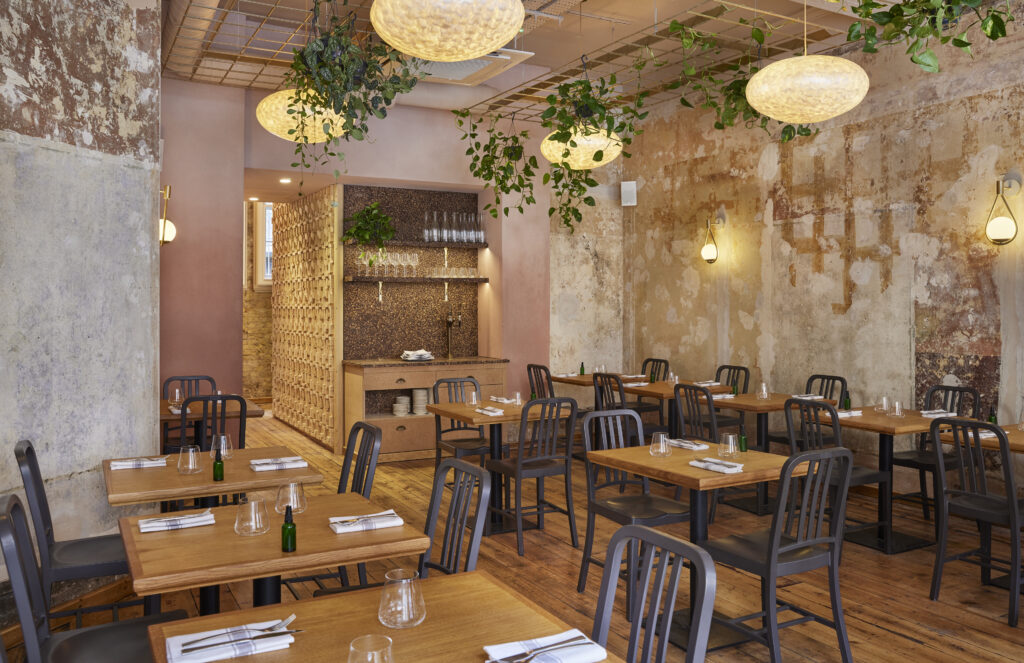
“So it’s very much looking at how we work, who we work with, how those relationships are formed. But also trying to work in a more circular way. So rather than having kind of linear relationships with suppliers or team or guests, it’s very much trying to look at that circle to say, well, how can we close that loop? How can we support you? How can you support us? Rather than just being a supply and demand.”
“You know, straight line. How can we actually turn that into a circle that we support each other and that we can do better things together? And then I think if you look at the sourcing as well in terms of one of the things that our suppliers that we like working with struggle to sell? […] So how can we then take that, which allows them to sustain their business? Actually but also in terms of minimizing any waste. How can we then take that turn to something delicious? That, we can also in a way subliminally educate our guests that actually awful can be delicious or certain things can be delicious. It’s just in the way that you actually prepare them.”
“But it’s very much about trying to have a NET positive impact and I don’t mean that in terms of … I think one of my bugbears is this kind of carbon tunnel vision that we talked about. Because I just think that there are so many other things that we need to be factoring in and some of those things naturally will reduce colon. Therefore, we don’t necessarily need to look at that as the BL and or it’s actually looking at everything that surrounds that.”
“So, it’s very much saying, how can we have a net, positive impact? And whether that is through, reducing our waste, whether it’s through increasing the joy we bring to people, whether it’s through encouraging people to come into the industry. I think all those things, you know, it’s very, very multifaceted.”
Cooking and… Law?
The chef shares how her not-so-kitchen-related background helped to create a strong business.
“Yeah. I think it’s, you can take something from every experience you have in life, can’t you? And I think for me, I guess, the organizational skills or the business skills being able to read a contract, those sort of things are very handy, when you’re running a restaurant and you running any business […] then be able to keep it within that circle rather than having to rely on many, many different people.”
“Actually, if you can rely on people that are very much in their line of thought. In terms of people that are working in the restaurant. That’s for me, that’s a better way of … a better use of a resource. So for me to be able to do those. Have those skills to bring to the table helps, I guess others, to be able to focus on what they what they need to do and their roles. […] we’re kind of constantly thinking as a team about how we can how we can improve how we can do things better. How can we reduce the use of something? How can we increase? Our the kind of as I mentioned before that kind of net positive impact, how can we be more positive and our impact?”
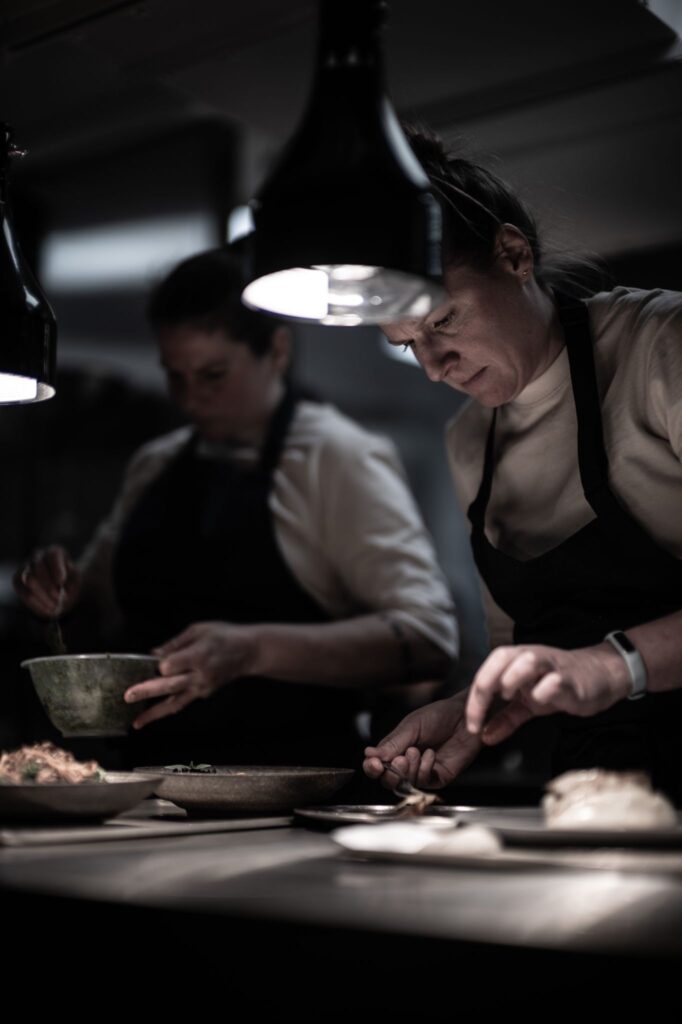
“And so for me, having a different background is also helpful. There are a lot of people in the restaurant that also have come from different backgrounds in terms of having started in food and have come into it later, mixed with those that have. So it creates this really interesting kind of little biodiverse ecosystem, I guess, whereas I think that’s a really great way of looking at it as if we are looking at a restaurant in terms of, you know, I love the analogy of a farm.”
“There are a lot of people in the restaurant that also have come from different backgrounds in terms of having started in food and have come into it later, mixed with those that have. So it creates this really interesting kind of little biodiverse ecosystem.”
“So you need to start with really good soil health. You need to plant your, you know, have different crops that some that have got deeper nitrogen-fixing roots, some that have really deep roots to kind of really retain that kind of moisture in the soil.”
“And then you’re looking at what crops go best next to others. So some can deter pests, some can attract other things. How can you ensure that you’ve got kind of this food all year round? How can you weather the storm? The things that are uncontrollable like whether it’s. Yeah, it’s own little functioning ecosystem.”
‘Apricity’ dares to be different.
What makes it different from any other restaurant?
“I was really intent on having an operation that was only five days a week from a mental health perspective, really. And mainly my own. In terms of having an operation that was going kind of seven days a week. It’s very hard. I find it very hard to switch off and to have my own regeneration or rejuvenation. So for me, that was really important. And that also, for the team that one of those days was a weekend day, so a Sunday. So that we could, they could, you know, spend time with friends or family.”
“The majority of the world works on her on the kind of Monday-Friday basis. So if we can have a little bit of that, you know, half of that then that’s for me. That was something that was really important.”
“So that’s one of the things I guess in terms of actually the way the fit-out was done very much working in a circular fashion with David Chenery from Objects Space Place who designed it for us with the intent of trying to repurpose as much as possible from the strip out.”
“Also trying to use as much recycled material as possible and really trying to be as efficient as we could be from day dot really. And then to the actual operation itself so things like we don’t use any cling film, we don’t use any, we minimise anything single use and it’s only if it actually is a necessity that we can’t get by without.”
“[…] the menu itself, we don’t print menus, they’re all digital, so that that allows us the flexibility to change constantly, which also feeds into the kind of the low waste, the zero-waste aspect, but also enables us to very much one of the benefits of that, which I didn’t get before we opened, was that it again it saves our most precious resource which is time. People’s time.”
“We also have the mentality that we don’t… Anything that is edible, we don’t throw it in the bin, so we find a way to use it. And then from even things like water energy, we don’t, we’re conscious of running taps or using too much water and things that we can then just kind of goes down the drain. Energy as well, so because we’re open Tuesday to Saturday on Saturday Night we switch off as many things as we can so that they also have a rest as well. So where we keep all of our to all the fridges with, in the kitchen itself, we turn them all off, we put everything into the big walk-in fridge. So, all the equipment gets a break as well, which, you know, in terms of longevity I think is really significant.”
“[…] the menu itself, we don’t print menus, they’re all digital, so that that allows us the flexibility to change constantly, which also feeds into the kind of the low waste, the zero-waste aspect, but also enables us to very much one of the benefits of that, which I didn’t get before we opened, was that it again it saves our most precious resource which is time. People’s time.”
“I think looking at our sales stats, we’re about 55% plant-based, and then 19% vegetarian, and then I think 15% meat, 12% seafood perhaps. So again… Kind of really focusing on the vegetable side of things, not eliminating meat, because I feel that for everything to co-exist and for the biodiversity in that we do have well-reared meat and dairy as part of its own ecosystem, it’s important. So that’s probably a smattering of kind of some of the things that we do to do things differently.”
“Yeah, it’s just it frustrates me that it becomes so binary so quickly, you know? Meat or no meat. It’s like actually there’s space for everything. There is space for everything that we can co-exist. And yes we need to eat more plants 100%. But we also need, you know, we need the animals to fertilise the soil, we need to look at how we… Many people are involved in farming in this country. It’s incredible. And is incredible people doing amazing, amazing things and you know, culture and livelihoods and history would all be just be turned off. If we suddenly said, no, let’s not eat meat anymore. I think it is it’s an important part of an ecosystem”
From a restaurant performance perspective, what are the results looking like?
“It’s been really positive and I still… This part of me that kind of thinks ‘Gosh is this actually happening? And working and functioning well?’ I think that I was really mindful of how we communicate what we do to start with. And not wanting to be a martyr about it and not wanting to … begin to say this is right, this is wrong. And the way to do that, I think we still analyze how we do it and we still want to find ways of being able to communicate better, but also to respect those people that come for a meal.”
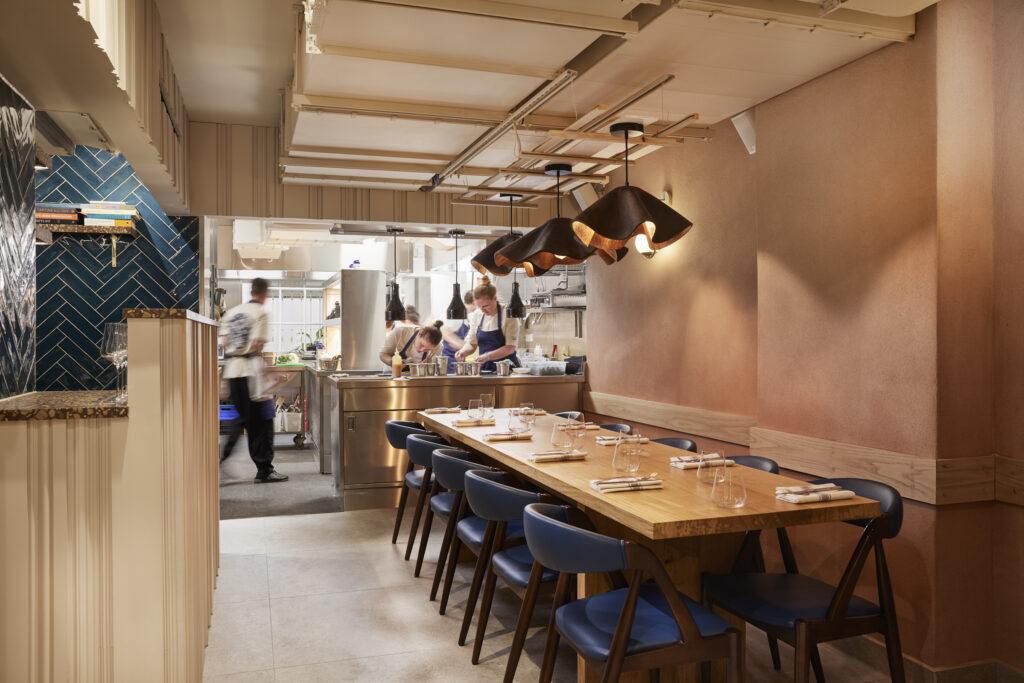
“Rather than actually wanting to know more, they just want to sit there and enjoy a meal. I think sometimes there’s that element of trust and inherent subconscious trust that, okay, I don’t really want to know anything more about my food, but I feel confident that what I’m eating has been well sourced, has been prepared by people that enjoy what they do, are being paid properly for what they do, and everyone in the ecosystem is being rewarded. So for me, it’s very much about that fine line between how much you saying, and how much you don’t.”
“But overall people that, you know, our feedback is overwhelmingly positive from everyone that visits the restaurant. And there is about the Ethos, but it’s also about the team and how amazing they are and that I really want, wanted it to be a place that was just very genuine and honest. So rather than there being kind of a lot of procedure or processes or that kind of distance between the team and the guest, actually for it to be just like going to someone’s dining room in the house and just sitting down and having a meal to eat. That there wasn’t that sense of yeah, disconnect really.”
“So again just feeling connected with everything that’s happening whilst you dining pre- and post as well. So yeah an inclusive experience, really. And I think that’s where the option of the fact that we do have a lot of plant-based options, but we also have meat. It means everybody, there’s something for everybody and I think you don’t need to also feel excluded. If you don’t want a particular thing, (or) you can’t have a particular thing, you can sit there with people that you may know – well you may not necessarily know well – but everyone can feel relaxed and comfortable within that setting.”
Bringing it to life
How do you create a culture that truly reflects and brings your philosophy to life?
“Yeah, I like that analogy, actually. I think it’s, it feels very much that it’s taken, I kind of feel I’m at that point now. I think if I’d done anything sooner, well, everything I had done sooner, I hadn’t been able to really define, I guess, that algorithm, as you say. I think for me now, it is very much about being honest and being transparent and being open about what we do, and how we do it. And also that we’re not there yet. And I think that is the, you know, we’re not this ‘Look at us. Look at us, we’re amazing!” It’s very much about. ‘Okay, we still have these challenges. How can we find it? How can we work hard to find the best way of doing things so that it makes it easier for others?’ That’s probably my ultimate game.”
“For me, there’s a bit of an issue with us deeming success to be financial. That’s the only objective metric we have in some ways, but I think actually, there needs to be more to that equation, especially for business as well, because I think if you can look at a business that’s financially successful, you can say, okay, great, but then what about the underlying aspects? What’s their social success? What’s the bigger picture? What do they contribute to society? What do they contribute to the planet?”
“So all these things that actually have kind of pretty big standing is to how to find that metric, which I don’t know, if anyone finds it, please tell me. But I think if you look at, yeah, for me, it was very much unlearning that actually the only metric was financial.”
The writing process of “Planted”
What actually made you write a book? Was it tricky?
“Yeah, it is. It’s Tricky. […] So I had co-authored a number of books before. So it wasn’t kind of my first show which made it a lot simpler.”
“But I think for me the reason for wanting to do it was I think I started cooking a lot more plant-based food probably 2015 at Tradewells, because I really felt that it was tricky for – this is when I guess veganism was becoming a thing, but for me it was very much about, again, kind of hearing the plants. But I guess it stemmed from the ethos of wanting the restaurant to be inclusive, so that, as I mentioned before if a family of four and you had two people that were plant-based and one that just only ate meat and one that didn’t eat fish, you want to be able to go out and actually have an experience that was really enjoyable.”
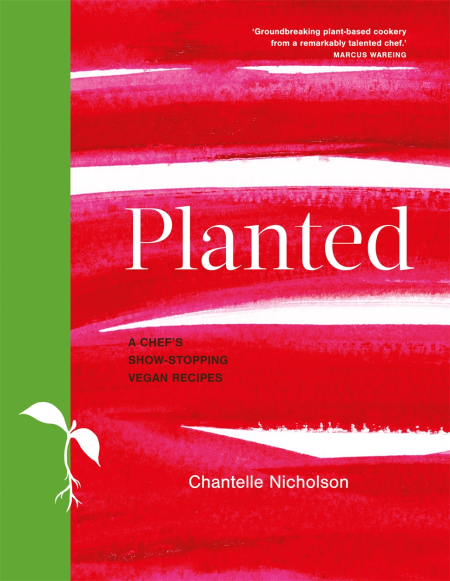
“So that’s when I started cooking a lot more plant-based food and I found that there weren’t too many resources out there for chefs in particular. So I kind of.. the more I started to kind of create these things. I thought actually I should put this in a book so it is accessible and usable for Chefs and also for home Cooks as well. So that’s where it all stemmed from.”
Chefs are embracing a more plant-based approach, while in the past, meat had to be present in all situations.
“I think that has been the kind of the rhetoric for a long time. The narrative. And still is for some Chefs and some operators. But I think that here willing harking back to my childhood and I’ve always loved a bitch ball so I think for me it’s not really a hardship, I’m not trying to take something and think how can they make this taste good because I think it tastes good anyway. So I think if I can just enhance that … that’s kind of my job and I think that vegetables get [… ] … we don’t give them the same love that we give, you know, to meat or fish, for example.”
“I always give the example that you would never steam a steak and eat it because it would be disgusting but we think nothing of doing that to the vegetables like cauliflower and then we feed them to children and expect them to eat them. But why? So I think that with the Maillard reaction that happens when you cook meat the same reaction happens with vegetables, we don’t often allow that process to happen.
The challenges that arise
How have the challenges impacted where you are on the journey right now and your day-to-day operations?
“I think – touch wood– In terms of the biggest crisis right now. Well, one of the biggest ones is staffing across the industry and yeah, – touch wood– we’ve not had any challenges with it as yet. I’m very mindful that things are quite precarious in terms of the amount of resources you have available within a restaurant, so things can shift very quickly and we have had people come and go but they’ve all gone for really great reasons as well. So for me, it’s like, actually, this ecosystem that brings about change, we kind of need to celebrate it rather than freaking out about it in some ways. But I think that you know, I think that a lot of what we offer is what people want.”
“Having the same two days off per week, having one of those days being a weekend it’s a huge draw card but I think overall it’s essentially. Because I think that there’s not enough appreciation of the fact of any industry that works outside that normal Monday to Friday 9 to 5. Even if you look at all those things that have to happen for all that we are. That we are used to, and that we take for granted. Airports, transport, hubs, and the supermarket, being open till 10:00 at night. There’s people, that all involve a lot of people and I don’t think it’s kind of recognized or valued as much as it should be.”
Because I think that there’s not enough appreciation of the fact of any industry that works outside that normal Monday to Friday 9 to 5. […] Airports, transport, hubs, and the supermarket, being open till 10:00 at night. There’s people, that all involve a lot of people and I don’t think it’s kind of recognized or valued as much as it should be.”
“And talking about the cost… I think the true cost of food is not recognized in restaurants. The true cost of how that plate of food got on that table, everyone that was involved in that process, every little cost and every little person involved just isn’t really understood. And I think that is a systemic issue because the true cost of what that cost to get there isn’t being recognized, which obviously trickles down to what people are paid as well.”
“And I think that it is one of those things where it is a passion, and sometimes it’s tricky to balance with work.”
She shared her thoughts on how the front-of-house staff needs more love.
“I think also it’s not necessarily seen as a career as a kind of valid career path in the UK for people to be working front of house or working as a chef. I think Chef is more so. But I think the front of house needs a lot more love because it is a framework that holds it all together.”
“This goes back to education and food education. And the fact that… I was on a talk this morning on a different podcast about how food education should be as important as Maths, English and Science. And yet is not. And for us to be able to feed ourselves. I would argue is probably the most important thing. You know, we can learn how to do additions and maths things that we need to function on a day-to-day basis pretty swiftly. To learn to cook and nourish yourself. I think is one of the most important things that we should be We should be teaching everybody.”
“And you look at the stage of our nation, and how obesity and malnutrition are both equally really big, big scary problems. And rather than fixing the source or fixing the true cause we’re just trying to look at kind of sticking plasters and things at the other end of the scale, rather than saying actually if we could educate and transform this whole system about teaching people to cook for themselves and what actually is important for their bodies, I think we’d be in a different place.”
What has been your biggest reflection, and how has it impacted you?
“I think probably the time that was a bit that biggest reflection for me was COVID. And I think had not happened. I don’t know what I would be doing now, to be honest, because it did… It had a hugely positive impact although it was incredibly challenging and tough… the outcome for me was probably pretty remarkable. I think the first lockdown was the first time in 17 or so years that I’d actually stopped. I hadn’t probably had more than, you know, kind of ten days off. And in that time.”
“So actually just to kind of stop and reconnect with even my local community, my friends, I hadn’t seen because I’d become kind of too busy and even at the doorstep chat or a FaceTime, […] And I think that was when I made the realization, kind of, I guess, dawned on me that I needed to stop what I was doing and do something different.”
“So that was probably the most profound kind of point of reflection, really. And I guess that’s when I realized that I wanted to open what Apricity now is. And I guess I did a pop-up in London Fields throughout that time, mainly because I was just freaking out. And I had this big, huge restaurant in Common Garden. I had more people than I had worked for. I had so much, you know, we were using every second table. We were only using kind of half the kitchen equipment.”
“So I just kind of thought, well, I need something positive to think about that’s going to keep my mind ticking. So that’s why, so that’s when I launched the pop-up. which actually, yeah, I guess was a bit of a precursor to Apricity, really.”
“Gave me that much-needed Beacon of light in the time where it was, yeah, it was pretty challenging out there.”
“I think for me and then to be able to open a new place after all of that. It was a huge opportunity because I could all those changes that I wanted to do. That I couldn’t do when I was stuck within that framework of previous businesses, I could do. And I kind of sit out my stool that’s what I would do from day one. I wouldn’t compromise on the things that had made me uncomfortable in the past.”
“Yeah, all the things I kind of thought, I don’t really feel comfortable and confident with this being able to open a business, post-pandemic make, actually gave me the opportunity to make all those changes.”
Making hard decisions as a business owner
Trust your gut and involve people in the decision-making process.
“I probably now, I trust my gut a lot more. So I make them more with my gut. I think I let my head say, and then I kind of go with what feels like the best option. And I probably talk to more people and share the burden of those decisions than I ever have before.”
“It is an interest actually involving them in decisions, whereas before I kind of thought, no, I need to make that decision. I need to make that hard decision myself because that’s my job. Whereas now, and it’s one of those unlearning things, is actually well, if you let that burden or not even the burden, but the challenge or the actually there could be some different perspectives that you hadn’t thought of it.
“Also just means it feels more comfortable when you have to make those hard decisions that actually, yes, you feel that you’ve got a good opinion based on what the outcome should be and then you work toward the outcome.”
Rest is the best meditation you can do.
“I think for me it’s also understanding the challenges and how I can then show up in my best way. If I’m not, you know, if my whole business is based around regeneration then if I’m not doing that to myself I’m just completely defeating the purpose. I think that’s been one of my biggest things. But the biggest learning curve is actually held on, like, having a break is incredibly important.”
If I’m not, you know, if my whole business is based around regeneration then if I’m not doing that to myself I’m just completely defeating the purpose.
“And again, it’s so that I can make sure I’ve got, you know, I get my creativity and my ideas are much, much better when I’m not burdened by either overtiredness or stress or having too much on my plate. And I think there’s a lot I want to do and there’s a lot I do that’s kind of, it’s external to the restaurant, but it’s all that same kind of ethos.”
“And for me, it’s really important that I’m able to do those things because it does, it enriches my education, it enriches my learning, which then can be brought back into the restaurant. So it’s very much ensuring that I have a good, rounded, I guess week and every day every week is different.”
Advice for leaders trying to build a business as a force for good: Do not seek perfection.
“I think it’s very much about having I think being realistic is one of them is really important is not being too aspirational. I think having a good amount of aspiration… is important but you’ve got to also temper that with what’s actually happening in reality and what’s possible.”
“I think also just ensuring that you […] (are) giving yourself breaks sometimes.”
“You know you can’t be perfect and perfection shouldn’t be something that you strive to achieve. You should be able to do as good as you can and I think very much involving people in that is really important and getting the skills around you that you don’t have. And the experience around you that you don’t have to then be able to have your as mentioned before this, this kind of farm analogy, you’ve got the right mix of crops.”
“So really kind of try and build it from from the ground up rather than from the top down and actually that ensures it’s robust it should ensure its able to go with the weather changes that happen. And yeah I think also in a way, it’s not having a destination in mind. I think I don’t really I have a destination in mind. I just want to make the journey as fruitful as possible and to be able to learn as much along the way and to enable others to learn along the way as well.”
“I think that you know, the saying of control what you can but don’t don’t try and control what you can’t is, it’s pretty important.”
What is the one thing everyone can do?
“I would say it is well there’s more than one else that this is a problem. I would say, as we meet and kind of embrace vegetables, and just embrace them for their deliciousness. Whether it’s using, or roasting a whole cauliflower. Whether it’s using some beans instead of to substitute with half of your meat.”
“Also, I think in terms of just valuing food more as well, and being really mindful of what you what you waste. […] It’s actually going a step pre that and just saying how your purchasing power is huge. And if you choose to buy support, again, your support for organizations that are doing great things is really important. And whether that’s just your local farmers market or whether it is what’s accessible to you and what’s possible to you. But I think just being conscious that the fact that that does have an impact.”
“The third thing I would say is and this is just a really personal bugbear. Two of these things are reusable coffee cups. I just, I have such a bugbear with single-use coffee cups.”
“[…] just get one of those reusable. This Dojo foldable little cups, keep it in. Keep it in your purse and your bag. And just really try not to use things that … Don’t need to be used, you know, the plastic bag text. We all stop using plastic bags because of five P. So, we could all stop using takeaway coffee cups. If we were just a bit more mindful of the impact of that.”
Do you like our content? Share with a colleague!




